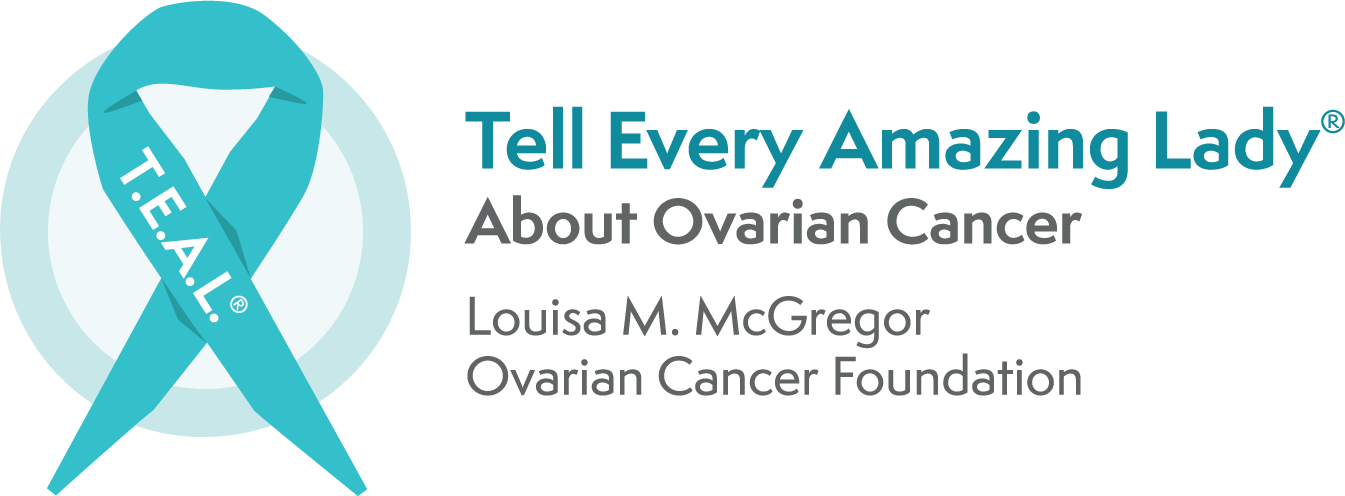Ovarian Cancer
Ovarian Cancer is the leading cause of death from gynecologic cancers in the United States and is the fifth leading cause of cancer death among U.S. women.

Did you know?
In the United States alone, there will be approximately 21,980 new cases of Ovarian Cancer each year, and about 14,270 women will die from the disease. There are 186,138 women currently living with Ovarian Cancer in the U.S. It is an insidious disease that can strike without warning or cause. THERE IS NO 100% ACCURATE SCREENING TEST FOR OVARIAN CANCER. THE PAP SMEAR DOES NOT TEST FOR OVARIAN CANCER.
The symptoms of Ovarian Cancer are often vague and subtle, making it difficult to diagnose. There is no 100% effective screening test for Ovarian Cancer but there are tests which may help when patients are at high risk or have early symptoms. In spite of this, patients are usually diagnosed in advanced stages and only 45% survive longer than five years. Only 19% of cases are caught before the cancer has spread beyond the ovary to the pelvic region. However, when ovarian cancer is detected and treated early on, the five-year survival rate is greater than 92%.
Signs & Symptoms
- Vague but persistent and unexplained gastrointestinal complaints such as gas, nausea, and indigestion
- Abdominal bloating, pelvic and/or abdominal pain, and/or feeling of fullness
- Frequency and/or urgency of urination
- Unexplained change in bowel habits (constipation or diarrhea)
- Unexplained weight gain or loss
- Unusual fatigue
- Shortness of breath
- Back pain
- New and unexplained abnormal postmenopausal bleeding
Risk Factors
- Increasing age, with highest occurrence in women over 50
- Family or personal history of ovarian, breast, endometrial, or colon cancer
- Uninterrupted ovulation (having no pregnancies, infertility, low parity)
- Presence of gene mutations, especially BRCA1, BRCA2, or Lynch

Prevention and Risk Reduction
- Use of oral contraceptives for more than five years can reduce your risk by approximately 50%
- Multiple pregnancies, having first full-term pregnancy before the age of 25
- Breast feeding
- Hysterectomy/Tubal ligation substantially reduces risk
- Removal of the ovaries and fallopian tubes (oophorectomy) dramatically reduces the risk of Ovarian Cancer
- Primary peritoneal cancer, which is microscopically almost identical to Ovarian Cancer, can still occur but is infrequent.
Have Your Doctor Perform the Following Tests Annually
- Ask your doctor for a CA-125 blood test, a transvaginal ultrasound, and a vaginal-rectal pelvic examination
- There is no accurate screening test for ovarian cancer
- A Pap test does NOT check for ovarian cancer!
- Note: These tests do not always indicate ovarian cancer and can misrepresent a biological state. Talk to your doctor about your results.
Questions to Ask
What do I do if I am concerned about my risk of Ovarian Cancer or have symptoms that persist and are unusual for me?
Speak to your gynecologist for more information and have an examination. Be sure to discuss the possibility of Ovarian Cancer with your doctor.
How is Ovarian Cancer diagnosed?
A vaginal-rectal pelvic examination (also called a bimanual exam) This exam allows the ovaries to be examined from many sides. Every woman should undergo a rectal and vaginal pelvic examination at her annual check-up with her gynecologist. Transvaginal Ultrasound This test uses sound waves to create a picture of the ovaries, and can often reveal if there are masses or irregularities on the surface of the ovaries. It cannot determine if you have cancer, but it can show characteristics that give different levels of suspicion.
CA125 blood test This test measures the level of a substance in the blood that may increase when a cancerous tumor is present; this protein is produced by Ovarian Cancer cells and is elevated in more than 80% of women with advanced Ovarian Cancers and 50% of those with early-stage cancers. Because CA125 misses half of early cancers and can be elevated by benign conditions, the National Cancer Institute (NCI) does not endorse using it to screen women at ordinary risk or in the general population.
It is very important to note that none of these tests are definitive when used on their own. They are most effective when used in combination with each other. The only way to confirm the presence of Ovarian Cancer suspected by the above tests is through a surgical biopsy of the tumor tissue.
The PAP test is used to detect cervical cancer, NOT Ovarian Cancer.
If tests suggest the possibility of Ovarian Cancer, seek a referral to a gynecologist or oncologist:
- A gynecologic oncologist is a professional who specializes in treating women with reproductive tract cancers.
- Gynecologic oncologists are initially trained as obstetrician/gynecologists and then undergo three to four years of specialized education in all of the effective forms of treatment for gynecologic cancers (surgery, radiation, chemotherapy and experimental treatments) as well as the biology and pathology of gynecologic cancers.
Why is it so important to be treated by a gynecologic oncologist?
The importance of being treated by a gynecologic oncologist cannot be stressed enough. According to numerous medical studies, there are significant survival advantages for women who are treated, managed, and operated on by a gynecologic oncologist.
How is Ovarian Cancer usually treated?
- Surgery, debulking, and surgical staging (removal of ovarian tumors)
- Chemotherapy
- Radiation therapy when appropriate
- Treatment for recurrent Ovarian Cancer needs to be determined by a gynecologic oncologist
Early Detection
Until we have better early detection tools, all women should be educated about the disease so they can achieve early diagnosis and successful treatment.
T.E.A.L.®’s Awareness Cards help educate the public and save lives.
- A woman’s lifetime risk of Ovarian Cancer is 1 in 75.
- Listen to your body.
- Do not ignore the symptoms.
Watch our episodes of “On the T.E.A.L.® Couch”, with special guest; Golda Arthur; creator of the Overlooked Podcast. In these episodes we dive into the importance of regular gynecologic health visits in prevention and early detection of ovarian cancer, among many other health issues.
